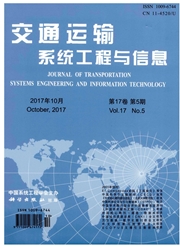

 中文摘要:
中文摘要:
用户均衡同系统最优之间通常存在效率损失,它已吸引很多学者来研究这种效率损失问题,但现有文献大多数局限于研究单用户类、确定性均衡的效率损失,而对多用户类随机均衡的效率损失研究得比较少.本文研究了固定需求网络中多用户类随机均衡的效率损失上界问题.通过利用变分不等式的方法,解析推导了固定需求网络中多用户类随机均衡分配分别在时间度量和费用度量两种出行决策准则下的效率损失上界.研究结果表明:时间度量下,其效率损失上界值同路段出行时间函数、网络复杂程度、网络需求以及用户对网络熟悉程度等因素相关;费用度量下,其效率损失上界值除了和上述因素有关之外,还与出行者的时间价值系数有关.
 英文摘要:
英文摘要:
There exists efficiency loss when introducing a user equilibrium traffic assignment in comparison with the system optimization assignment. Seeking the upper bound of the efficiency loss has attracted many scholars' attentions. The existing researches mainly focus on single user class and deterministic traffic as- signment, few on stochastic user equilibrium (SUE) assignment with multiple user classes. In this paper, the authors investigate the upper bound of this SUE' s inefficiency. Two decision making criteria are used in the SUE, namely, time-based and monetary-based. It is shown that the upper bound of efficiency loss caused by the time-based SUE depends on the type of link travel time function, the network complexity, the travel demand, and the degree of users' perception error to travel cost. The upper bound of efficiency loss caused by the monetary-based SUE depends on the value of time of user classes besides the aforementioned factors.
 同期刊论文项目
同期刊论文项目
 同项目期刊论文
同项目期刊论文
 Equity and efficiency analysis of pricing strategies in a bi-modal network with heterogeneous user g
Equity and efficiency analysis of pricing strategies in a bi-modal network with heterogeneous user g Modeling the evolutions of day-to-day route choice and year-to-year ATIS adoption with stochastic us
Modeling the evolutions of day-to-day route choice and year-to-year ATIS adoption with stochastic us Modeling time-dependent travel choice problems in road networks with multiple user classes and multi
Modeling time-dependent travel choice problems in road networks with multiple user classes and multi One-step solution fabrication of magnetic chains consisting of jingle-bell-shaped cobalt mesospheres
One-step solution fabrication of magnetic chains consisting of jingle-bell-shaped cobalt mesospheres Support vector machine forecasting method improved by chaotic particle swarm optimization and its ap
Support vector machine forecasting method improved by chaotic particle swarm optimization and its ap Static floor field and exit choice for pedestrian evacuation in rooms with internal obstacles and mu
Static floor field and exit choice for pedestrian evacuation in rooms with internal obstacles and mu A model for evaluation of transport policies in multimodal n etworks with r oad and p arking capacit
A model for evaluation of transport policies in multimodal n etworks with r oad and p arking capacit 期刊信息
期刊信息
